Deus Ex: Mankind Divided Review – lesser sibling of Human Revolution
Developing a sequel that surpasses the original is always a challenge. In case of Mankind Divided, the goal was partly achieved. While the gameplay hits all the right notes, the plot leaves something to be desired.
The review is based on the PC version. It's also relevant to PS4, XONE version(s).
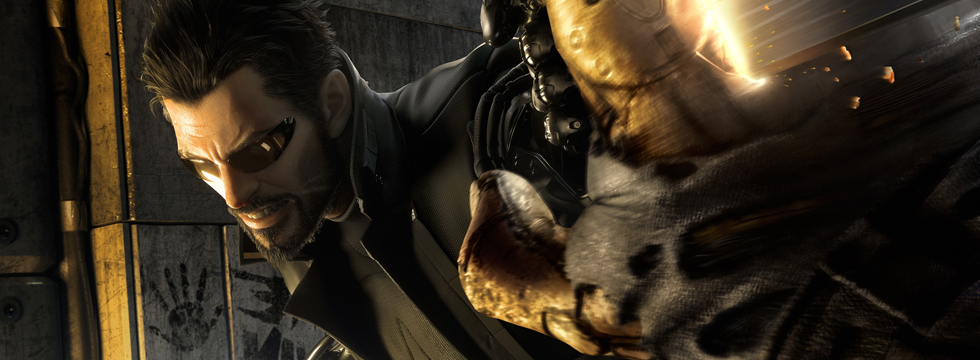
- Familiar mechanics in an upgraded version;
- Playable both as a real stealth game, and a real shooter;
- Great audio-visual side;
- Referencing other games from the series;
- Jensen is in top shape;
- Old friends;
- Interesting side quests;
- Generally good plot...
- ...with a disappointing finale, which comes too soon;
- Bonus mission cut out from the campaign;
- Only one boss, and not too demanding at that.
I can’t recall any other recent game that made me as pumped for its release as Square Enix’ Deus Ex: Mankind Divided. The trailers were flawless, and other promotional materials only deepened my yearning for learning the next part of Adam Jensen’s fortunes and misfortunes. Creating such hype, however, is a two-edged sword, since fans’ expectations can skyrocket. Considering the fact that Deus Ex: Human Revolution has set the bar pretty high, Eidos Montreal had quite a challenge to face. With all certainty, this is one of the greatest releases of this year, but does the struggle of Adam Jensen with the biggest and most dangerous Masonic lodge in the world really deliver?
Augmentalipse now
As we all know very well, the next renaissance – sparked with overcoming the mortal boundaries of mankind with technology – has been put to an end on one tragic day in the year 2027, when augmented people lost it, and killed or injured millions of their neighbors as a result of malfunction of their implants. The media, controlled by advocates of the New World Order, quickly told the citizens of the dystopian Earth what they should think about the event and the people who involuntarily wreaked havoc with their own hands – and thus a mechanical apartheid begun. It’s obviously in someone’s interest to exclude from society those who enhanced (or harmed, if you prefer) their bodies with augmentations. In this heavy atmosphere we’re introduced to the new game. And right in the middle of everything there’s Adam Jensen, the former chief of security in Sarif Industries, and now an Interpol agent and an informer of a hacker group called Juggernaut Collective, and – most notably – a man who had half his body replaced with augmentations.
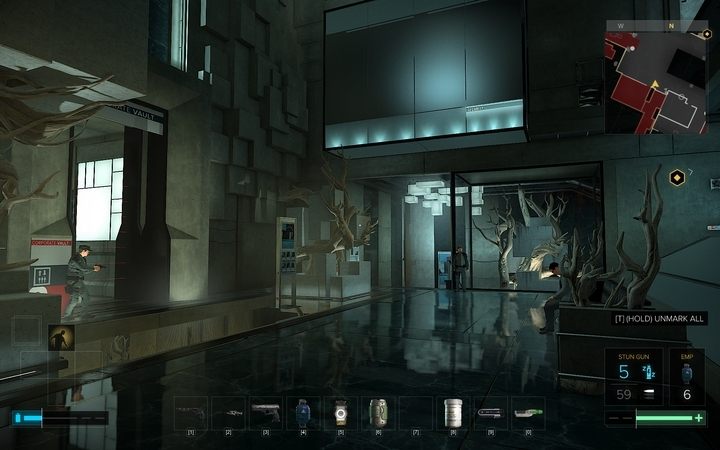
A bulk of this adventure takes place in Prague, Czech Republic. The atmosphere of the said mechanical apartheid is tangible at every corner of the city. In some locations, police will stop us to check Jensen’s ID – apart from places where this is justified by the plot, it can also happen if Adam doesn’t follow the segregation rules on the metro, and takes a seat among “natural” people. If the player does so, other passengers will scowl at Jensen during a cutscene which is displayed when a new hub loads; it’s a nice little touch. Anti-augmentation attitudes can be observed everywhere: offensive graffiti, unpleasant remarks of pedestrians, and over-reacting police (I sometimes felt that half of Prague’s inhabitants are policemen). The charm of the – rather dreary – Czech capital is reinforced by the fact that the designers, once again, made sure that the language of the country that the game takes place in is actually used. Mankind Divided without a doubt manages to create an immersive atmosphere, one totally different from what we’ve seen in Human Revolution.
Unfortunately, there isn’t enough traffic in Prague – the policemen either stand in one place, or walk along the same paths. It didn’t really bother me in Human Revolution’s Detroit and Hengsha, but after five years I was hoping for something more. After all, this is a triple-A title: hoping for a big, interesting city bustling with life that has nothing to do with the player’s actions shouldn’t be wishful thinking. And yet we spend most of our time in pretty similar, gray, underpopulated streets and alleyways of a couple of small districts (which load way to long), and no more than two locations could be called memorable. Less than a dozen people in a red lights district late at night just doesn’t seem right. The ghetto on Prague’s outskirts is a different story, however. In Útulek Station, sometimes referred to as Golem City, we can see people with augmentations herded into claustrophobic, monotonous rooms, and it seems well thought-out and reasonable (in the context of the setting, of course). Fortunately, when it comes down to stealth elements, everything’s in place: there are many places to dispose of the bodies or hide yourself, there are intervals in patrols when Jensen can sneak around the guards, and there are things to discover. Bottom line is that Mankind Divided can be really immersive, but didn’t manage to avoid shortcomings which, at times, are pretty flagrant.
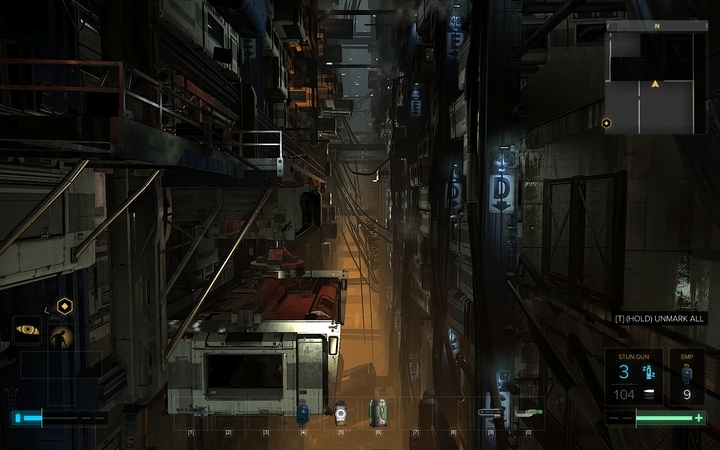
Gods from the machine
The driving force behind the series is the story, revolving around intricate plots of those who control the world. Mankind Divided is no different in this aspect, although I regret to admit that Eidos Montreal hasn’t quite delivered. What went wrong? One of the main ingredients, i.e. the plot of the game. To cut right down to the chase: it’s not nearly as complex as the one in Human Revolution, and, since this is a game about a Masonic conspiracy, this factor is hugely important. I established this diagnosis after the game’s climax, which came completely out of the blue. I was sure that the main thread was just starting to unfold – I had just defeated my first boss, after all. But no, I was astounded to learn that I could now start the game one more time in the NG+ mode. I half-expected this to be a joke, like that in Batman: Arkham City, when, if while playing as Catwoman, the player decided not to help Batman, and instead ran away with the loot. That was not the case here, however. I took care of the boss (without even killing him), which wasn’t particularly difficult either, Jensen revealed his next prime suspect, I learned a bit about the consequences of the protagonist’s actions, and then… end credits appeared. If you watch about half of the credits, you will see an animated sneak-peak teasing the next part.
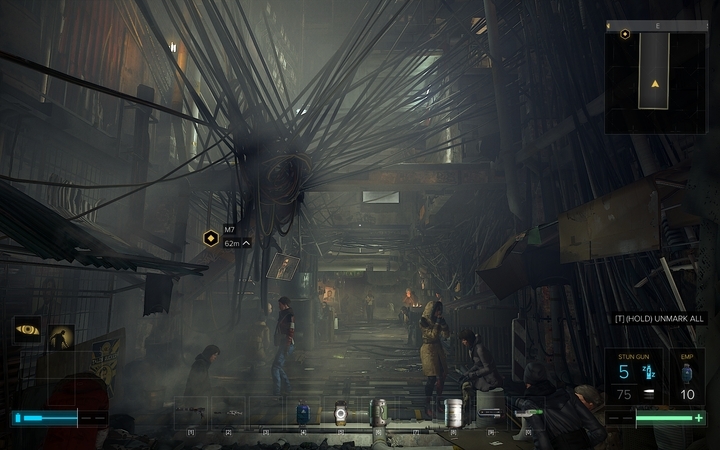
Hence, I can see two ways out of this: either we will pay for DLCs, in which we will be able to learn the remaining parts of the story of Mankind Divided, or we’ll have to wait another five years for the next full game that will get us another step closer to the events of the original Deus Ex. I cannot honestly tell which of these alternatives is worse. One way or another, I felt as if the campaign had to meet a certain duration limit, forcing the developers to cut it and squeeze it in order to fit it into a pre-determined timeframe. This is a big problem, since an unsatisfactory ending can render the whole experience feeble. That’s a huge mishap for Eidos Montreal.
Just to be clear: I really had fun playing the game – minus the ending which made me feel as if I’d fallen asleep and missed half of the story. Mankind Divided is very similar to Human Revolution, which is not a bad thing at all. I liked the idea of being a double agent, who’s not sure who – if anyone at all – he can trust beside himself. A great novelty are mutually exclusive decisions – for example, at one point Jensen has to choose between obtaining vital information and saving somebody’s life, and the choice is not at all that obvious. On top of that, there are many characters in Mankind Divided, as well as various, more or less obvious references to previous installments in the series. The side quests were also a lot of fun, and proved to be a nice diversion from the main plot. Truth be told, there isn’t too many of them, but at least they’re not simple fetch quests – not typical ones; instead, they provide pretty interesting stories. Sometimes finishing them left me with a slight disappointment that I can’t actually learn more about them, but let’s face it: most games suffer from this problem. In Mankind Divided, you can play a detective, a cracksman, an assassin, or a freedom fighter.
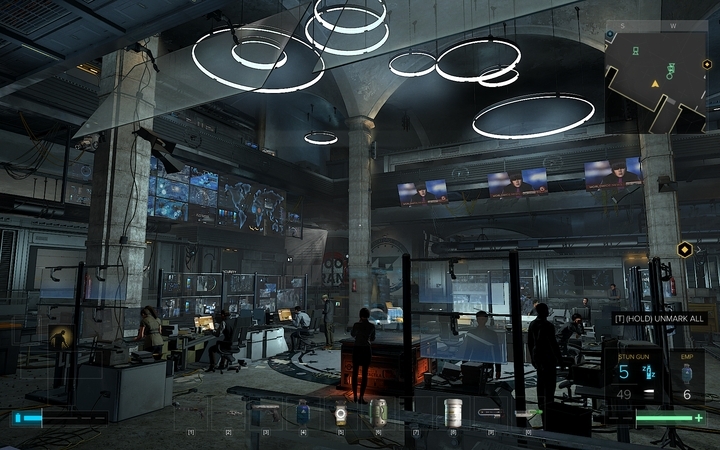
Interaction with NPCs is pretty much identical to what we’ve seen in Human Revolution. We can choose different ways of talking to people, which often changes the shape of the whole quest, and influences the reaction of the person Jensen talks to. Secondary characters are also pretty interesting – they’re not flat, and nice to come back to as the story progresses. I have to complain some more, however: I haven’t encountered (perhaps with one exception) any event that would be emotionally as deep as meeting Wayne Haas – Jensen’s old friend from the SWAT times, or the confrontation of Jensen with Megan in Singapore. The same goes for verbal duels, which weren’t as powerful as in Human Revolution, where the conversations sometimes reminded boss fights with words instead of bullets.
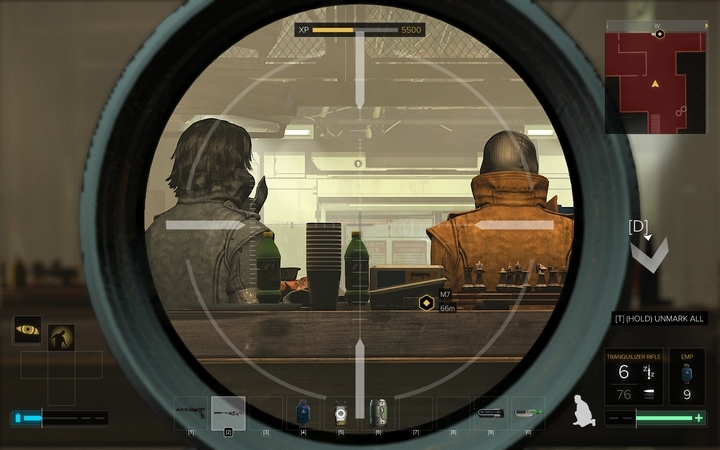
Jensen is still in good shape; a gruff man who doesn’t smile often, although this time he sometimes throws in a pretty witty remark or a sarcastic retort. Though he’s a rather closed-off character, on a couple of occasions his sensitive side reveals itself. Not that he starts sobbing in the corner or anything – but at times you can really see that he’s not just a puppet dancing on the players’ strings who doesn’t care about the virtual world around him. After all, the stakes are very personal for him. Too bad that this time we have to manage without the full-time, not-too-polite sidekick. The Jensen-Pritchard duo could do some real damage.
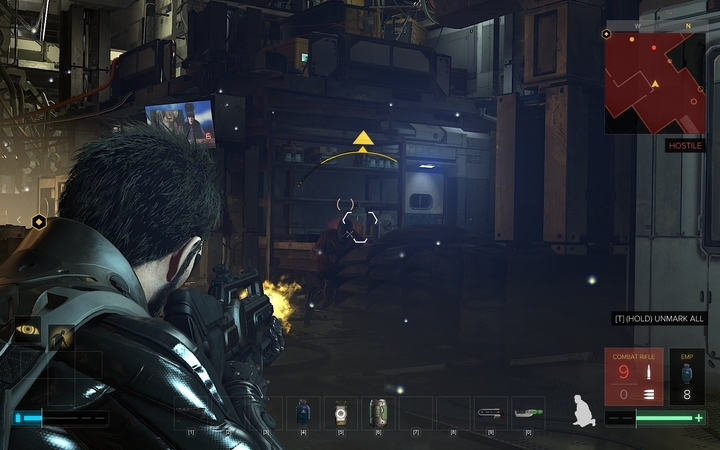
Before I discuss the mechanics, just one quick word about the bonus mission (which comes, e.g., with game’s pre-orders). Since the more fancy editions of Mankind Divided are accompanied by a season pass, we can expect more of such additional adventures. In fact, this mission is just a piece of the campaign, which has been cut out from the game, and advertised as bonus content. As I’m not good at foreseeing the future, I won’t guess what else the season pass owners will get, but it seems reasonable that a similar situation will be repeated.
The easy way & the hard way
The story of Deus Ex: Mankind Divided begins in Dubai – it’s a tutorial and an introduction to the plot. The beginning allows the player to get acquainted with the game’s mechanics, and to repeat every action without any consequences until they feel confident and can face all the game’s obstacles, both animate and inanimate. If you’ve played Human Revolution, then learning Mankind Divided will be a piece of cake – most solutions from the previous game have been reiterated, and sometimes slightly upgraded. The gameplay is almost identical – the player can instantly switch from 1st (exploration) to 3rd (cover) person perspective. The energy (stamina) still has to be managed carefully (protein bars have been replaced with chems); the same goes for the inventory. We can still either sneak past unaware enemies, or make them meet the maker, and Jensen still can manipulate the environment in order to make access to different locations easier. The interface hasn’t been tremendously modified either, and still remains very intuitive. In general, the differences are cosmetic, and after the first mission, you get a pretty good idea of what’s what.
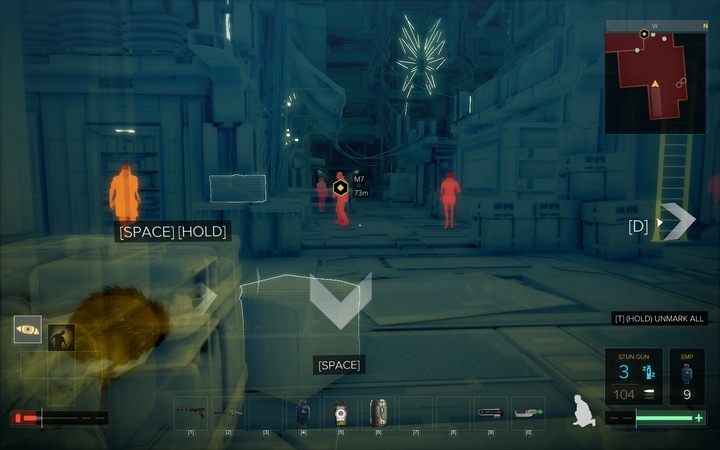
The way Eidos Montreal decided to design the gameplay in the new Deus Ex reminds me a bit of RockSteady Studio and their Batman: Arkham’s policy of “more of the same thing”. That’s not to say there’s nothing new in this part. The new, experimental augmentations stand out the most – there’s for example an ability to launch a nanoblade; it can be used for distracting opponents or nailing them to walls. There are also the P.E.P.S. and Tesla guns, which can stun a handful of enemies at once, or the Titan armor system, which renders Jensen immune to all types of physical attacks for a brief period of time. All these can be useful, but if you’d really like to, you could probably finish the game without using most of the augmentations.
The weapon stock remains almost the same as well – the collection of guns has been enhanced with a battle rifle, which has a different fire rate, magazine capacity, and recoil than the assault rifle. Unfortunately, it came at the price of the crossbow (or have I just not managed to find it?) and the “stand-alone” P.E.P.S. The most notable change, however, is the enhanced modification system. Apart from different accessories such as a silencer or a laser sight, the player can now modify guns with crafting items found throughout the game – this allows for increasing damage, or fire-rate, or even the fire mode, which can be extremely useful if gunplay is your style. Additionally, at any point during the game, a prompt menu can be opened, where the player can choose the type of ammunition they use, select fire mode, or mount different accessories – it’s a great solution.
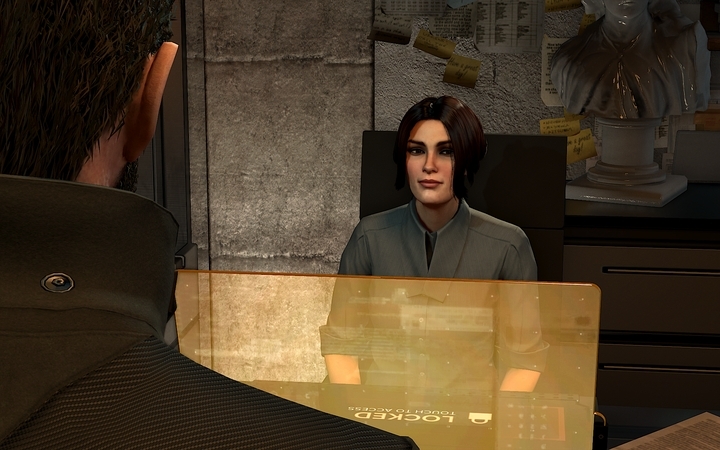
How do these elements work under pressure? I chose a stealth-pacifier play style, so let me begin with discussing this approach. The third person mode, bringing to mind an upgraded Mass Effect 3 cover system, has been revamped, and now allows easier moving from cover to cover (and also beyond them), which in turn allows to sneak around enemies. This is especially useful if you decide to use the new system of take-downs. Here, it’s possible to knock out an enemy from behind cover, which additionally takes the body out of other enemies’ sight. You can, for example, take cover next to a door, and if an enemy is unfortunate enough to happen to walk through it, Jensen will quickly acquaint the guard’s head with the door’s frame, and, within the same move, throw the unconscious guard into the room, avoiding being exposed, and buying some time to prepare the next move. The AI has also seen some changes. The guards are not only better at raising alarms, but also search for Jensen more thoroughly, which increases the difficulty. The game gives a warning though – there’s a two-color “detection bar” filling when guards are about to spot you.
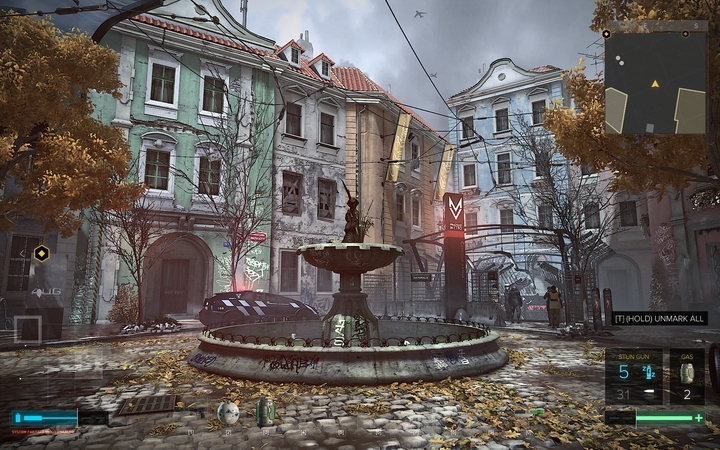
Unfortunately, the agents of counter-terrorist units are not very keen on simple methods, and don’t use pepper spray, mini-crossbows, or truncheons, as UNATCO have. Those are quite simple tools, but they could provide a lot of fun for the pacifistic lot. Currently, their arsenal is limited to tranquilizing bullets, stun guns, and a couple of augmentations (among them a less-lethal edition of Typhoon system) plus flashbang and gas grenades. Take-downs become boring eventually, since the set of finishers is pretty limited – to make matters worse, the game can sometimes display the same animations a couple of times in a row, which doesn’t help one bit.
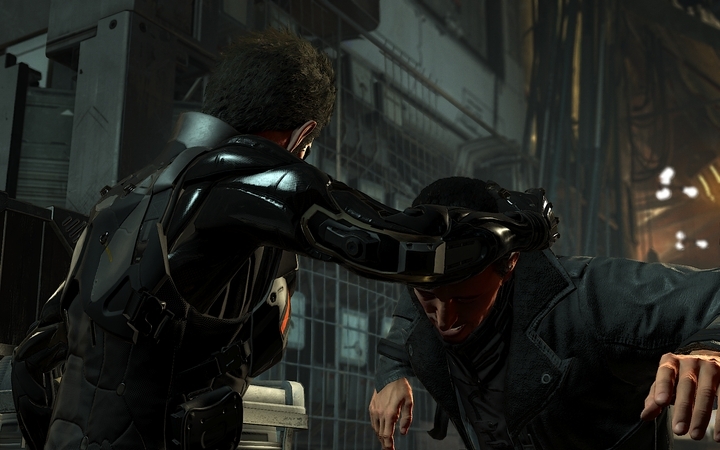
If we decide to go for a hostile approach that involves the use of serious weapons and fighting our enemies to the death, we'll surely notice some subtle differences, even though – as I've already mentioned – Mankind Divided is basically an identical experience as the previous part of the series in terms of the way we play. First of all, a greater role in the exchange of fire is played by enemy armor and so we have to choose just the right gun. What's more, we have more frequent encounters with opponents equipped with heavy machinery and/or a variety of augmentations, sometimes even on par with those Jensen has. Drones can also be quite the nuisance, since it's difficult to hide from them. This is where the change of the way EMP grenades work is the most painful, as they are currently only temporarily interfering with the functioning of electronic equipment. I would go so far as to say that Deus Ex: Mankind Divided works well as a shooter, if we want fast-paced action combined with ambitious story, but getting into a firefight is still less profitable from the point of view of character progression, because this way we don't get various, rather generous, bonuses. Which, in my opinion, is a plus, as it helps to retain the spirit of the series. Anyway, a good ammunition stock, major combat enhancement, and a trained eye can also easily lead us to the end credits, probably in a much shorter time. Whatever floats your boat then.
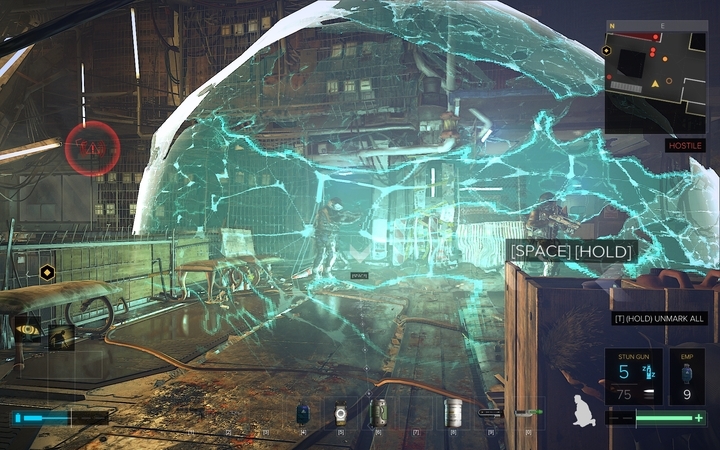
Hacking in virtual reality
The virtual reality technology introduced in the universe of Deus Ex proved groundbreaking for hackers, as evidenced by the mini-game called Breach. In a nutshell, this extra gameplay mode is based on the same principles as the rest of the reviewed title, although it has completely different visuals. We play as a hacker using a VR avatar who breaks into highly secured servers of, e.g., large corporations. Using different hacking software – imitating the function of various implants and a variety of power-ups – we can not only test our skills in a race against time and compare our accomplishments with other players, but also get to know the various secrets hidden by targets of our attack. This is an interesting addition for those who don't mind a more arcade gameplay and minimalist graphics, but personally I feel that a more reasonable step would have been to issue Breach as a separate title in the free-to-play model (I almost forgot: we can also help our hacker with microtransactions) sometime later and focus more on the main campaign storyline, which definitely needed it more. Personally I’m more of a fan of the quiet operation and deadly effectiveness than completing the same sequence multiple times against time and for points, but Square Enix is clearly trying to make their game avoid the label of a hardcore stealth production.
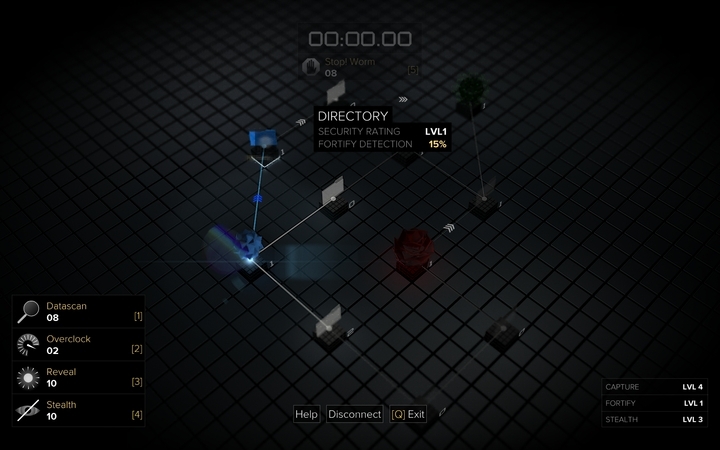
First-class looks and sounds
Audiovisuals in Deus Ex: Mankind Divided are really top-notch. What dominates are dark and subdued colors; even NPCs don't wear flashy outfits. The graphic style is quite similar to that of the previous full-fledged installment in the series, although this time the production does not fall behind modern technical standards (it is also one of the few published titles supporting DirectX 12, although we'll have to wait for this attraction). As for the music, I’ll remain a bit boring with my assessment: after a really great soundtrack of Human Revolution, which still often graces my speakers, Mankind Divided is only good – the music does its job well, but fails to entrance. I was expecting a lot more from artists as experienced as Michael McCann and Sonic Mayhem, whose work I know and appreciate.
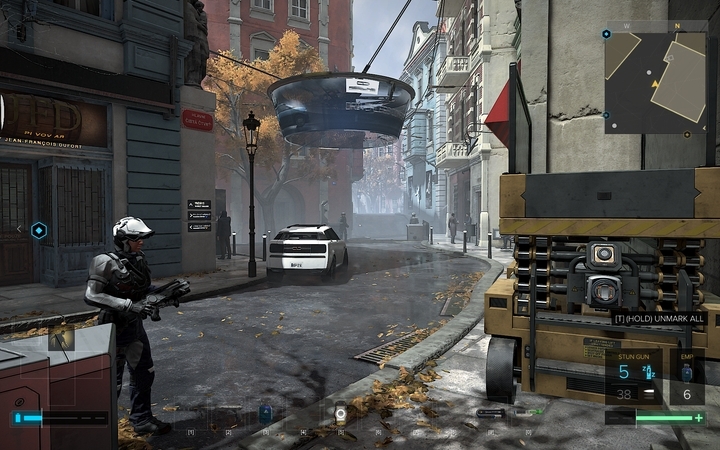
“It's not the end of the world, but you can see it from here”
Deus Ex: Mankind Divided is a really solid production, although it can't be assessed without comparing it with Deus Ex: Human Revolution. Without a doubt, progress made in the mechanics is a positive thing, especially since the designers managed to keep its intuitive character. The game thus has a chance to reach a wider audience, especially fans of FPSs and TPSs, while remaining attractive for stealth fans. Still, there are some shortcoming, and this time in the extremely significant element, namely the story, which is not without its consequences on the overall reception of the game. That's why the rating is lower than that of Human Revolution, which despite its gameplay imperfections left a much better impression once completed.
Errors in the machine
The version I played was not without mistakes. The biggest nuisance is associated with savegames created in third-person mode. Once they are loaded, Jensen in most cases pops out of hiding, often straight at armed opponents. It's incredibly annoying. In addition, when playing on Windows 7, the game burdens the CPU (i5 4690K) too much, making the game freeze for a couple of seconds rather frequently. I hope that the version on launch will get rid of such problems.
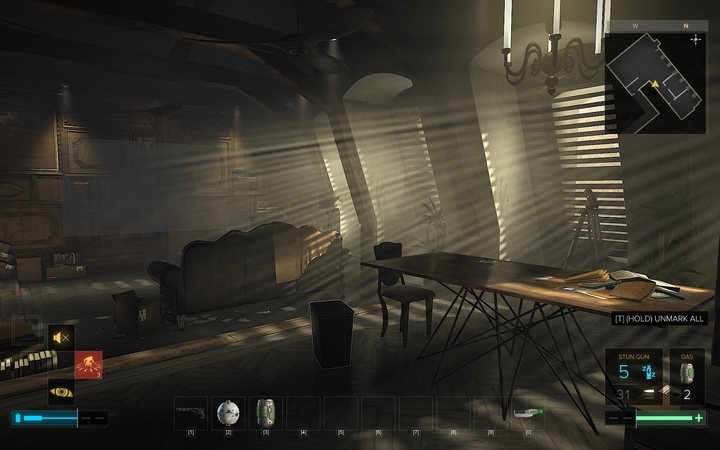
I have to point out that taking up Mankind Divided without being familiar with at least Human Revolution or having superficial knowledge of the events of the first Deus Ex is a bad idea, especially since the game definitely lacks an extensive glossary and compendium of information (a bit of information you can learn while loading levels). For fans of the series it is of course a must-have, but if you aren't overly attached to the Deus Ex series, it's not a bad idea to postpone the purchase of Mankind Divided – if only to see what else the season pass will offer or to revisit the previous installments before diving right into the new adventure of Adam Jensen.
Deus Ex: Mankind Divided
Deus Ex: Mankind Divided Review – lesser sibling of Human Revolution
Developing a sequel that surpasses the original is always a challenge. In case of Mankind Divided, the goal was partly achieved. While the gameplay hits all the right notes, the plot leaves something to be desired.

